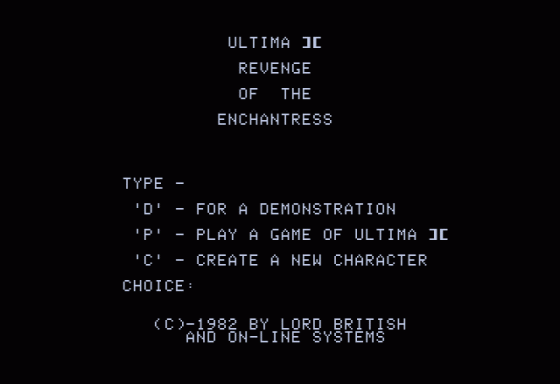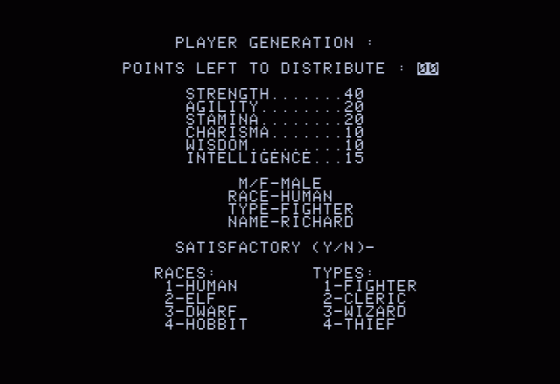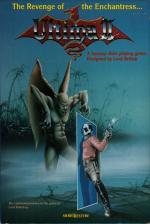
Personal Computer News
 18th March 1983
18th March 1983
Categories: Review: Software
Author: Richard King
Publisher: Origin Systems
Machine: Apple II
Published in Personal Computer News #002
Ultra-violent days
Ultima II
Ultima II covers every planet in the solar system, including the sun itself. It ranges from the days of legend to far in the future in five time zones, and has a cast of thousands - including Warren Beatty and Diane Keaton...
This has to be the biggest game you have ever seen, by a long chalk. But although it's almost a great game, it falls short. Because of its ambition, it is a notch over the top.
Objectives
You are an adventurer - just what sort of an adventurer is up to you. You can be a brawny muscle-man wielding a battle-axe, or a wise but frail wizard living on your wits. You start with a total of 99 points which you share out among a lot of attributes for your character. You also have to pick a race and profession.
First Impressions

The box is emblazoned with suitably romantic artwork, and the first thing you find inside looks suspiciously like a tea-towel. It is a piece of cloth printed with a crude map of the world and emblazoned with strange symbols. They are in fact Tolkien's runic alphabet, the Cirth, described in Lord of the Rings. The instruction manual is written in the dazzlingly twee style the Americans do so well. Your computer, you discover, is "Ultima's supreme being and controller!" You are told to make a copy of the player-disk here; you can make as many as you like, giving each character a different set of abilities.
In Play
The first thing you see is an animated picture of a dragon, spitting fire. You can either create a player, play a game, or demonstrate the game. If you choose to create your character, distribute your 99 points carefully, and watch out when you decide on your race and profession. These two have a noticeable effect on certain of the attributes.
I found this section of the program a little inadequate. Your first try at creating a character for an adventure seldom comes out right. You should therefore be able to modify at will, but Ultima II simply allows you to make an entry, and then moves on.

You must allocate at least ten points to each attribute, but if you give 25 each to the first three, thus making it impossible to satisfy the rules, the program won't let you back up. The only way out is to put in some impossible figure like 88, which wipes the whole display.
Pressing 'P' for play sets the disk in motion, and the screen clears to reveal a small white figure in the middle of a map.
This map is one of the best parts of Ultima II. It's composed of large squares, with different colours and textures, each of which is a different terrain, and where there's water it ripples. Unfortunately, as it was written in the US, where the Apple colour set is reversed, the water is purple, the trees are brown and the mountains are green.

As you move your character, he or she stays in the centre and the screen scrolls appropriately. The redrawing is very fast, and gives a real feeling of motion if the REPEAT key is held down.
The first thing to look for is some safe place, because you have neither armour nor weapons, and you need to talk to somebody to find out what's going on.
There are all kinds of horrors wandering about, and they all make a beeline for you. They have none but the worst possible intentions, so the only choice is to try killing them with your bare hands. They run as fast as you do, but you don' know where you're going. They do - after you.

If you manage to survive the journey and reach a town or castle, you may enter by pressing 'E' when standing on the square. Towns are where your character can buy equipment, food and transport. Castles have other commodities.
My first character, Ishtar, died of starvation while trying to kill her fourth Orc with her bare hands.
She'd spent almost all her money on chain-mail and a sword, only to be told when she tried them on that she had neither the strength to wear the armour, nor the skill to wield the sword.

I'd created my character as an Elvish Cleric, hoping to capitalise on a bit of agility and wisdom. The instructions suggested that a high charisma rating would be useful for extracting information and bargaining, so I chose a female. This didn't seem to make much difference.
With Ishtar's failure in my mind, I created a new character called Gruma. He was a thoroughly nasty piece of work, largely brute strength and bad breath.
I bought weapons and armour, buckled them on and went off to slaughter the natives. Gruma had no trouble in disposing of almost anything he met, and with him I discovered the function of time-doors.

These are purple squares which appear and disappear. If you move into one you find yourself in a different place, frequently in a different time.
At first this is confusing, and you stumble blindly in and out of them. The cloth map is supposed to guide you, but it's some time before you begin to understand it.
I found myself wandering about, trying to keep out of trouble, visiting anywhere and talking to everybody. Most of the inhabitants say something pretty dull, but a few give away real gems.
But even the strongest warrior takes a few hits, and good gets low, so it's soon time to repair to the place where you can get more of each. No, I won't tell you where.
After some few hours of play Gruma had amassed several hundred experience points, had sailed the seven seas, visited foreign lands and battled with sea-monsters, but despite all that didn't seem to be getting anywhere.
Gruma was tough, but not exactly smart. He did of starvation in 1990, just outside New San Antonio. There was no food to be had for nearly a thousand years in either direction.
Verdict
The main feeling of Ultima II is the poor characterisation. This is probably because the authors spent so much of the memory on the map of the world that they had nothing left to keep halfway-decent data-tables on the actors.
The result is that, apart from in the towns, the only way to get along with anybody is to kill them.
The sheer scale of the game is impressive, and apart from the mind-numbing violence, there's plenty to do and discover. At £42.88, it is expensive but good value, since it will provide a challenge for some time.





